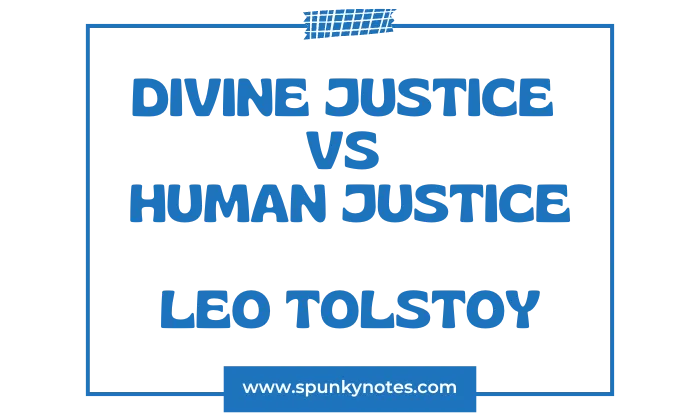
Q. In what ways does this story explore the idea of divine justice vs human justice?
Leo Tolstoy’s short story “God Sees the Truth, But Waits” raises deep questions about the nature of justice. In this story, Tolstoy contrasts two kinds of justice: the flawed, imperfect justice of humans and the slow but certain justice of God.
The story follows the life of Ivan Dmitrich Aksionov, a man who is wrongfully convicted of murder and spends many years in a Siberian prison. Through Aksionov’s suffering, patience, and ultimate forgiveness, Tolstoy presents the difference between human justice and divine justice in a simple but profound way.
The Failure of Human Justice
One of the main ideas in the story is the failure of human justice. Aksionov is an innocent man, but he is wrongfully accused of murder. When the police find a bloody knife in his luggage, they immediately assume he is guilty.
They don’t investigate further or consider that someone might have framed him. Despite Aksionov’s protests of innocence, the courts and authorities are quick to convict him based on limited evidence. He is sent to prison for a crime he did not commit.
This shows that human justice is flawed. It is based on what people see or think, but people can be wrong. The justice system in the story is shown to be hasty and unfair.
There is no room for doubt, and once the system has decided Aksionov is guilty, there is no going back. He spends 26 years in prison for something he did not do, simply because human justice is imperfect and relies on the limited knowledge and judgment of people.
The Role of Patience and Faith
While Aksionov suffers from this injustice, he does not lose his faith in God. He believes that even though people have judged him unfairly, God knows the truth.
This is where the idea of divine justice comes in. Unlike human justice, which can be quick and wrong, divine justice is slow but certain. Aksionov understands that God sees everything, even if people do not. His faith helps him endure the years of wrongful imprisonment.
During his time in prison, Aksionov becomes a humble and pious man. He learns to be patient and to forgive those who wronged him, even though he suffers greatly.
His transformation in prison is important because it shows that, although human justice has failed him, he trusts that God’s justice will come eventually. Aksionov’s faith in divine justice gives him peace, even when he has no hope of being freed by human authorities.
Divine Justice Revealed
After many years in prison, Aksionov meets Makar Semyonich, the man who actually committed the murder. At first, Makar tries to intimidate Aksionov, but over time, Makar’s guilt begins to weigh on him.
Eventually, Makar confesses the crime to Aksionov, asking for forgiveness. Aksionov has the opportunity to reveal Makar’s guilt to the authorities and finally clear his own name. However, Aksionov chooses not to. Instead, he forgives Makar and leaves his fate in God’s hands.
This moment is significant because it highlights the difference between human and divine justice. Human justice would demand that Aksionov expose Makar and seek revenge or restitution for the years he lost in prison.
But Aksionov chooses to follow a higher path, trusting that God will judge Makar in the end. He believes that it is not his place to punish Makar; that is God’s responsibility. In this way, Aksionov shows his complete faith in divine justice, even though human justice has failed him.
The Nature of Divine Justice
In the end, Makar confesses his crime to the authorities and asks for forgiveness. While this does not change the fact that Aksionov has spent most of his life in prison, it brings a kind of spiritual closure to the story.
Aksionov dies soon after Makar’s confession, but he dies in peace, knowing that the truth has finally been revealed. This outcome reflects the idea that divine justice is slow but sure. It may take many years for the truth to come out, but in the end, it does.
Aksionov’s patience and faith in God are rewarded, not by being freed from prison, but by the revelation of the truth and the chance to forgive Makar.
This shows that divine justice operates on a different timeline from human justice. It is not concerned with immediate punishment or reward but with the deeper truths of guilt, repentance, and forgiveness.
Forgiveness
One of the most important aspects of divine justice in the story is forgiveness. Aksionov’s decision to forgive Makar rather than seek revenge or expose him is a key moment in the story.
By forgiving Makar, Aksionov rises above the limitations of human justice. He understands that true justice comes not from punishing wrongdoers but from offering forgiveness and letting God handle the rest.
Makar’s confession and Aksionov’s forgiveness also show the power of redemption. Makar, who had lived with the guilt of his crime for many years, is finally able to repent and seek forgiveness.
Aksionov, in turn, finds peace through his act of forgiveness. This exchange between the two men suggests that divine justice is not just about punishing the guilty but about giving them the chance to repent and be forgiven.
Conclusion
In “God Sees the Truth, But Waits,” Leo Tolstoy presents a story that contrasts human justice with divine justice. Human justice, as seen in Aksionov’s wrongful conviction, is flawed and often unfair. It is based on limited information and can lead to great suffering for the innocent.
Divine justice, on the other hand, is slow but certain. It is based on truth, and it offers the possibility of forgiveness and redemption.
Aksionov’s story teaches us that while human justice may fail, we can find peace through faith in divine justice. Even when the world is unjust, patience, forgiveness, and trust in God can bring inner peace and ultimate justice.

